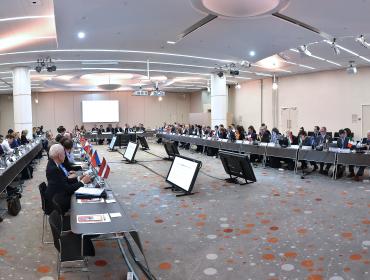
BEREC Workshop on Oligopoly Analysis and Regulation
On 25 February 2015, in Berne, Switzerland, BEREC held a public Workshop on oligopoly analysis and regulation, hosted by the Swiss Federal Communications Commission (ComCom) and Federal Office of Communications (OFCOM / BAKOM / UFCOM). The workshop was attended by more than 160 participants from 64 different organisations.
The Workshop had the objective to trigger additional reflection regarding the application of the existing regulatory framework to oligopolistic situations and their impact on the market regulation.
The main topics discussed during the Workshop:
- Trends leading to oligopolistic market structures, namely mergers and acquisitions, in the EU;
- Market analysis in the context of potential oligopolistic situations;
- Remedies in the context of oligopolistic situations.
The Workshop was moderated by Prof. Brunno Jullien, IDEI Researcher, Member of the Toulouse School of Economics (TSE). The main speakers at the event included the BEREC Chair, representative of the Chief Competition Economist at DG Competition (European Commission), the Heads of ComCom and RTR and representatives of the following stakeholders: ECTA, ETNO, GSMA, EAFM and Cable Europe.
Some of the main conclusions from the workshop, are the following:
- Telecoms markets are oligopolistic in nature due to the characteristics of the market, namely: high investment costs, sunk costs, economies of scale, fast technological progress, high rate of innovation, network externalities and scarcity of spectrum in mobile markets;
- Trends of concentration are also widely observed;
- As other drivers of concentrated markets, the need for more investment, the convergence and the evolution of bundle offers are new sources of pressure which lead to less operators in markets.
However, oligopolies are per say not harmful, although some markets are more susceptible to uncompetitive outcomes than others. Uncompetitive outcomes can lead to threats to the interests of end-users (risk of slower innovation, higher prices and lower quality), can increase the likelihood of coordination, which could lead to harmful effects, or can raise a potential problem of foreclosure. In some cases oligopolies can also bring benefits to market, in terms of incentives for investments and innovation.
As a general conclusion from the workshop, it was emphasised that there is no need for new regulatory tools in order to deal with oligopolistic situations and the use the existing ex-ante regulation remedies should in principle be sufficient, but on a case by case basis there might be a need for use of other regulatory tools to remedy the situation. For example, in the mobile markets there might be a need for including additional requirements in the rights of use.
More information about the specific topics for discussion can be found in the documents provided in the current section of the BEREC website.


